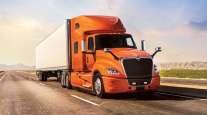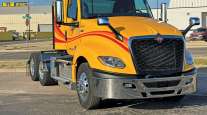Navistar’s Clarke Touts Deal With Volkswagen

Volkswagen AG’s pending acquisition of 16.6% of Navistar International Corp. for $256 million will provide the Lisle, Illinois, truck maker with cash soon and then more efficient procurement and better access to new technology for engines and other applications, Navistar CEO Troy Clarke said in an interview.
It could also lead to a merger of the two companies.
“This deal will make us better, faster,” Clarke told Transport Topics on Sept. 6, several hours after the deal was announced.
RELATED: Navistar, Volkswagen agree on strategic alliance
Clarke, Navistar’s CEO since 2013, and his new partner, Volkswagen Truck & Bus head Andreas Renschler, dodged specificity on merger questions, neither guaranteeing one nor ruling it out.
“We’re excited to work together,” Clarke said, adding, “Let’s leave the next chapter open for today.”
Renschler, the head of Daimler AG’s global truck unit from 2007 to 2013, said the deal helps turn VW into a “global champion” of truck-making, and as for the possibility of a full merger, “all options are open.”
When complete, the cash-for-new stock deal would give VW an ownership stake very similar to investors Carl Icahn and Mark Rachesky. Those two investors each have two seats on Navistar’s nine-member board of directors, and Volkswagen Truck & Bus, which is based in Brunswick, Germany, will get that, too. Collectively, VW, Icahn and Rachesky will own about half of Navistar.
Both Clarke and Renschler described the agreement, roughly six months in the making, as a broad framework that will be filled in over time by working groups to be named later.
The two manufacturers stressed truck powertrains. Renschler mentioned engines, transmissions and axles.
Clarke said Navistar’s N13 diesel truck engine is an example of the cooperation between the two companies that predates this week’s deal. The N13, formerly the MaxxForce 13, is based on MAN SE’s 13-liter engine. MAN is one of VW’s three main commercial vehicle brands, with Scania AB and VW being the other two.
Clarke said the ability to use VW technology through a licensing agreement is highly desirable.
“Scale means a lot on technology because the costs [of research and development] are high,” he said, adding that Navistar and VW also share an interest in telematics and connected vehicles, and cooperation on those fronts could arise from the recent agreement.
The procurement benefit comes from VW’s greater size. If Navistar can piggyback on Volkswagen’s purchasing power, it could save the company $500 million over five years, Navistar said.
The two parties said the deal must be approved by the Federal Trade Commission and/or the Justice Department, in accordance with the federal Hart-Scott-Rodino Act. The FTC’s website said the target for judgment on an application is 30 days after formal filing, which had not taken place by Sept. 6, the companies said.
Clarke said he expects the deal will be completed later this year or in early 2017.
For more coverage of the Volkswagen-Navistar deal, see the Sept. 12 print issue of Transport Topics.




